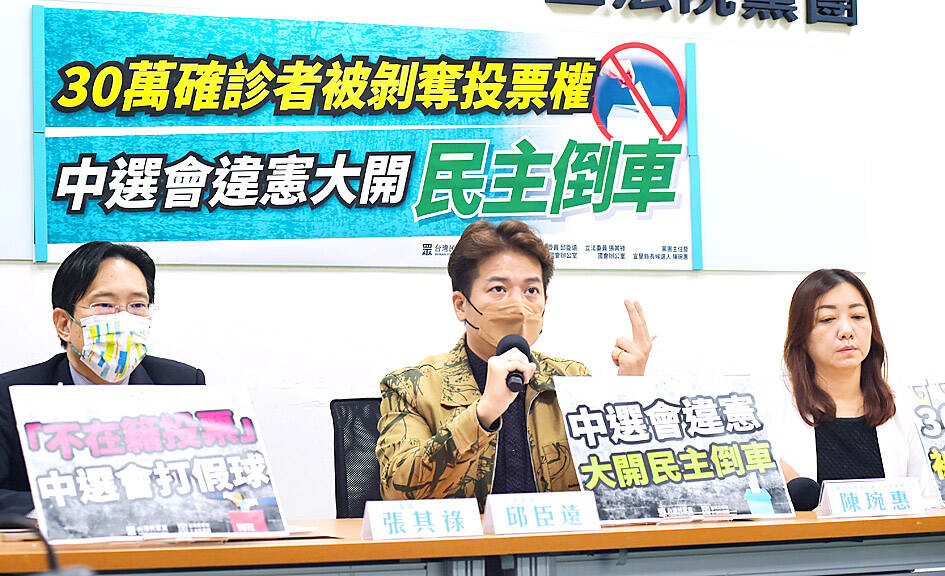The Taiwan People’s Party (TPP) caucus yesterday urged the Central Election Committee (CEC) to consult voting regulations in the US, Japan and South Korea to create a way for people infected with COVID-19 to vote in local elections on Nov. 26.
CEC Chairman Lee Chin-yung (李進勇) said last week that all eligible voters can cast ballots if they comply with measures implemented under the Communicable Disease Control Act (傳染病防治法).
Under the policy, people who test positive for COVID-19 and are under mandatory seven-day isolation during the elections would not be allowed in polling stations.

Photo: Fang Pin-chao, Taipei Times
TPP caucus convener Chiu Chen-yuan (邱臣遠) told a news conference yesterday that the US allowed COVID-19 cases to be inside polling stations in the 2020 presidential election if they wore masks and kept a social distance of at least 1.8m.
South Korea extended voting hours during its presidential election in March and allowed COVID-19 cases and people who were under quarantine to vote by driving or taking disease prevention taxis to voting stations during the final 1.5 hours of polling, Chiu said.
Japan passed a bill in June to allow COVID-19 cases and people who were under quarantine to vote by mail or allowed them to vote at exclusive polling stations during its House of Councilors election in July, he said.
The CEC and the Central Epidemic Command Center “should not pass the buck between each other” by saying that “there is no legal ground,” Chiu said.
A proposed amendment to the Referendum Act (公民投票法) to allow absentee voting was submitted to the legislature more than two years ago, but the CEC did not propose its own version, he added.
Chiu asked the CEC to draft a plan for absentee voting five months ahead of last year’s referendum, to which Lee replied that such a system would need to be electronic and would require nine months to create.
However, no effort was made to pass the amendment or establish the absentee voting system in time for the local elections, Chiu said.
TPP Legislator Jang Chyi-lu (張其祿) said that Democratic Progressive Party caucus whip Ker Chien-ming (柯建銘) blocked a Chinese Nationalist Party (KMT) caucus proposal to hold an extraordinary legislative session to deliberate the amendment in July last year, saying at the time that it should be delayed until the following legislative session.
The CEC said in October last year that absentee voting would not be allowed in the referendum held in December last year, as “regulations and complementary measures were not in place,” Jang added.
Absentee voting is a common practice allowed in democratic countries around the world, Jang said, citing examples of migrant workers from Indonesia and the Philippines being able to vote in their countries’ elections while in Taiwan, and nearly half of Estonia’s votes being cast online.
As a “technology island” and a democratic model in East Asia, Taiwan should prioritize implementing an absentee voting system, he said.

Chinese spouse and influencer Guan Guan’s (關關) residency permit has been revoked for repeatedly posting pro-China videos that threaten national security, the National Immigration Agency confirmed today. Guan Guan has said many controversial statements in her videos posted to Douyin (抖音), including “the red flag will soon be painted all over Taiwan” and “Taiwan is an inseparable part of China,” and expressing hope for expedited reunification. The agency last year received multiple reports alleging that Guan Guan had advocated for armed reunification. After verifying the reports, the agency last month issued a notice requiring her to appear and explain her actions. Guan

GIVE AND TAKE: Blood demand continues to rise each year, while fewer young donors are available due to the nation’s falling birthrate, a doctor said Blood donors can redeem points earned from donations to obtain limited edition Formosan black bear travel mugs, the Kaohsiung Blood Center said yesterday, as it announced a goal of stocking 20,000 units of blood prior to the Lunar New Year. The last month of the lunar year is National Blood Donation Month, when local centers seek to stockpile blood for use during the Lunar New Year holiday. The blood demand in southern Taiwan — including Tainan and Kaohsiung, as well as Chiayi, Pingtung, Penghu and Taitung counties — is about 2,000 units per day, the center said. The donation campaign aims to boost

The Kaohsiung Tourism Bureau audited six hotels in an effort to prevent price gouging ahead of Korean band BTS’ concert tour in the city scheduled for Nov. 19, 21 and 22 this year. The bureau on Friday said that the audits — conducted in response to allegations of unfair pricing posted on social media — found no wrongdoing. These establishments included the local branches of Chateau de Chine, Hotel Nikko, My Humble House, and Grand Hai Lai, it said, adding that the Consumer Protection Commission would have penalized price gougers had the accusations been substantiated. The bureau said the Tourism Development Act

The military yesterday said it has located the flight data recorder, or black box, of an F-16V jet that disappeared off eastern Taiwan earlier this month, and it would soon deploy a salvage team to try to retrieve it. Air Force Command Headquarters said that while it had pinned down the location of the black box, it was still searching for the aircraft’s sole pilot, air force Captain Hsin Po-yi (辛柏毅). Without providing details, the air force said it had located the black box days after detecting some intermittent signals and would now engage a team of professionals to retrieve it. The air